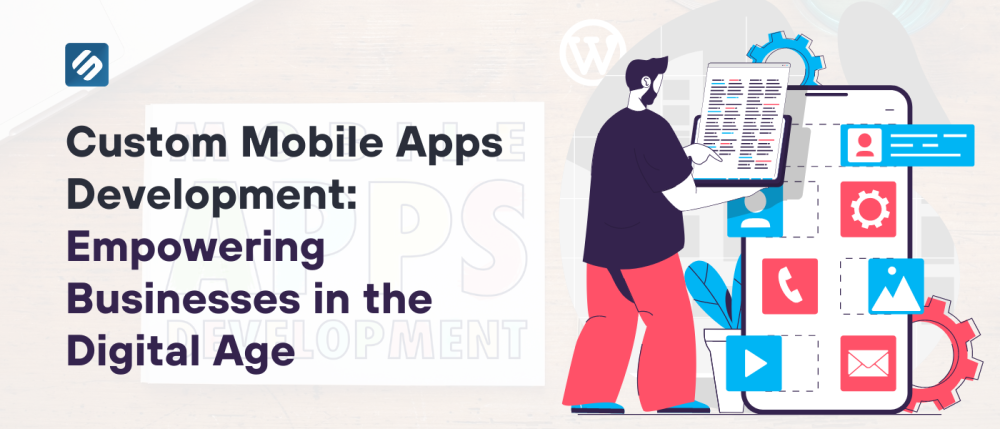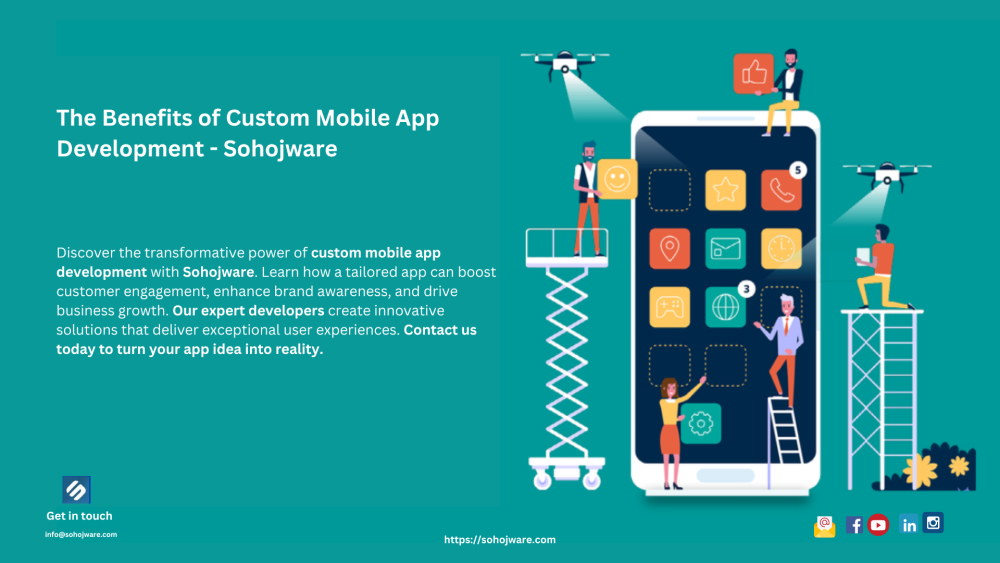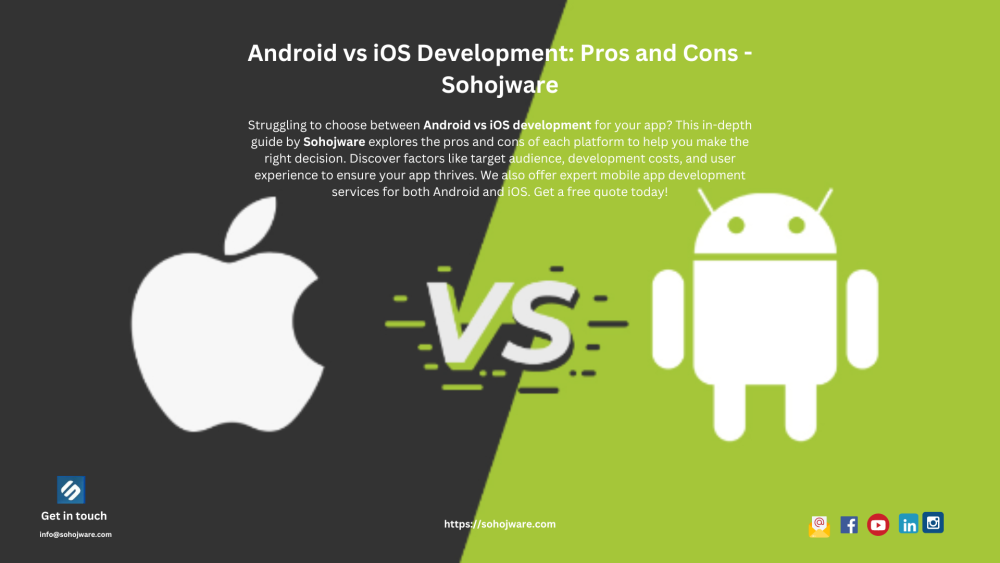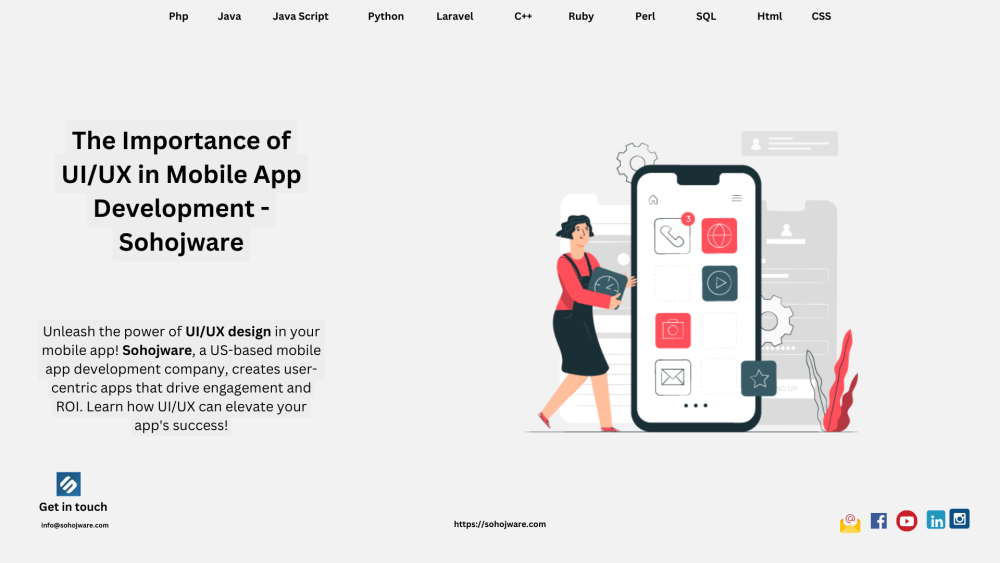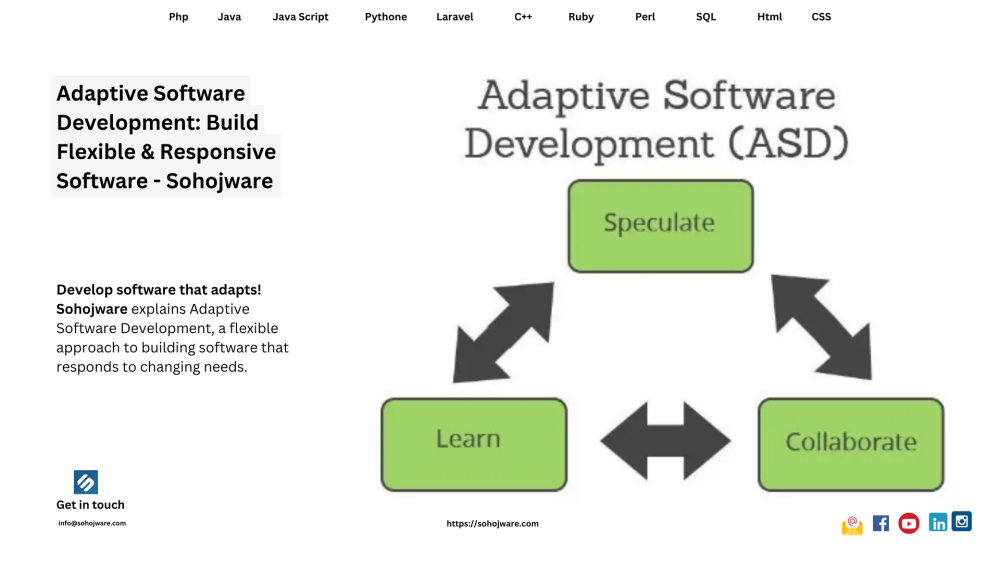Are you looking to take your business to the next level? In today's digital landscape, having a strong online presence is crucial for success. One way to achieve this is through custom mobile apps development.
In this comprehensive guide, we will explore the world of custom mobile apps development, its benefits, and how it can empower businesses of all sizes. So, let's dive in!
Table of Contents
| Sr# | Headings |
|---|---|
| 1. | Understanding Custom Mobile Apps Development |
| 2. | Why Choose Custom Mobile Apps? |
| 3. | Key Features of Custom Mobile Apps |
| 4. | The Process of Developing Custom Mobile Apps |
| 5. | Factors to Consider for Custom Mobile Apps Development |
| 6. | Cost and Time Estimates for Custom Mobile Apps |
| 7. | Benefits of Custom Mobile Apps Development |
| 8. | Success Stories: How Custom Mobile Apps Transformed Businesses |
| 9. | Mobile Web Apps vs. Native Apps: Making the Right Choice |
| 10. | Custom Mobile Apps vs. Off-the-Shelf Solutions |
| 11. | Trends in Custom Mobile Apps Development |
| 12. | Security Considerations for Custom Mobile Apps |
| 13. | Testing and Deployment of Custom Mobile Apps |
| 14. | Maintenance and Updates for Custom Mobile Apps |
| 15. | Future Prospects of Custom Mobile Apps Development |
1. Understanding Custom Mobile Apps Development
Before we delve into the details, let's start by understanding what custom mobile apps development is all about. Custom mobile apps are tailor-made applications designed to meet the specific needs of a business or organization.
Unlike off-the-shelf apps, custom apps are built from scratch and can be fully customized to align with your business processes and goals.
2. Why Choose Custom Mobile Apps?
You might be wondering, why should I choose custom mobile apps over ready-made solutions? Well, the answer lies in the unique advantages that custom apps offer. Here are a few compelling reasons to opt for custom mobile apps:
-
Personalized User Experience: Custom apps allow you to create a seamless and personalized user experience tailored to your target audience's preferences.
-
Enhanced Efficiency: By incorporating features that streamline your business operations, custom apps can significantly improve your overall efficiency and productivity.
-
Scalability and Flexibility: Custom apps are designed to grow with your business. You can easily scale up the features and functionality as your business expands.
-
Competitive Edge: Custom mobile apps give you a competitive edge by offering unique features and functionalities that set you apart from your competitors.
3. Key Features of Custom Mobile Apps
Custom mobile apps come packed with a range of features that can be customized to fit your business requirements. Here are some key features commonly found in custom apps:
-
User Authentication and Security: Protect your app and user data with robust authentication and security measures, ensuring a safe user experience.
-
Push Notifications: Keep your users engaged and informed with push notifications that deliver personalized messages and updates.
-
Integration with Existing Systems: Seamlessly integrate your custom app with your existing systems, such as customer relationship management (CRM) tools and backend databases.
-
Offline Functionality: Enable your app to function offline, allowing users to access important featureseven without an internet connection.
-
Social Media Integration: Integrate social media platforms into your app, allowing users to easily share content and interact with your brand.
-
Analytics and Reporting: Gain valuable insights into user behavior and app performance through built-in analytics and reporting features.
4. The Process of Developing Custom Mobile Apps
Developing a custom mobile app involves a series of well-defined steps to ensure a successful outcome. Here's a brief overview of the typical app development process:
-
Planning and Strategy: Define your app's goals, target audience, and desired features. Conduct market research to identify trends and competitor offerings.
-
UI/UX Design: Create wireframes and design the user interface (UI) and user experience (UX) of your app. Focus on intuitive navigation and visually appealing design elements.
-
App Development: Develop the app using programming languages such as Java or Swift. Implement the desired features and functionality based on the design specifications.
-
Testing and Quality Assurance: Thoroughly test the app to identify and fix any bugs or performance issues. Ensure compatibility across different devices and operating systems.
-
Deployment: Publish your app to the relevant app stores, such as the Apple App Store or Google Play Store. Prepare app descriptions, screenshots, and promotional materials.
-
Maintenance and Updates: Continuously monitor and maintain your app, addressing any user feedback or reported issues. Regularly release updates to introduce new features and improve performance.
5. Factors to Consider for Custom Mobile Apps Development
When embarking on a custom mobile app development project, several factors need to be taken into account. Consider the following aspects to ensure a smooth and successful development process:
-
Clear Objectives: Clearly define your app's objectives and align them with your business goals. Determine the problem your app solves and the value it brings to users.
-
Target Audience: Understand your target audience's preferences, demographics, and behavior. Design the app with their needs and expectations in mind.
-
Platform Selection: Choose the appropriate platform(s) for your app, such as iOS, Android, or both. Consider factors like target audience, budget, and development resources.
-
Budget and Timeline: Determine your budget and set realistic timelines for the app development process. Account for development, testing, deployment, and ongoing maintenance costs.
-
UI/UX Design: Invest in a visually appealing and user-friendly design. Ensure the app's interface is intuitive, engaging, and aligns with your brand identity.
6. Cost and Time Estimates for Custom Mobile Apps
The cost and time required to develop a custom mobile app can vary based on several factors, including:
-
App Complexity: The complexity of your app's features and functionality will influence development time and cost. Simple apps with basic functionality will be less expensive and faster to develop compared to complex apps with advanced features.
-
Platform(s) and Devices: Developing for multiple platforms and devices will increase development time and cost. Each platform (iOS, Android) may require separate coding and testing.
-
Design Requirements: Elaborate UI/UX designs, animations, and custom graphics will add to the development time and cost.
-
Integration and Backend Development: Integrating the app with existing systems, such as databases or APIs, will require additional development effort.
It's essential to consult with a professional app development agency to get an accurate cost and time estimate based on your specific app requirements.
7. Benefits of Custom Mobile Apps Development
Investing in custom mobile apps development offers numerous benefits for businesses. Here are some key advantages:
-
Enhanced Branding: A custom app allows you to showcase your brand identity and values, reinforcing your brand image among users.
-
Improved Customer Engagement: By offering aseamless and personalized user experience, custom mobile apps increase customer engagement and satisfaction.
-
Increased Efficiency: Custom apps streamline business processes, automate tasks, and reduce manual efforts, leading to increased efficiency and productivity.
-
Data-driven Insights: Custom apps provide valuable data and analytics that help businesses make informed decisions and identify trends, preferences, and opportunities.
-
Competitive Advantage: Having a custom app sets you apart from competitors and positions your business as innovative and customer-centric.
-
Customer Loyalty and Retention: A well-designed and feature-rich app enhances customer loyalty, encourages repeat business, and improves customer retention rates.
8. Success Stories: How Custom Mobile Apps Transformed Businesses
Custom mobile apps have transformed businesses across various industries. Here are a few success stories:
-
Uber: The Uber app revolutionized the transportation industry by offering a seamless booking and ride-sharing experience.
-
Starbucks: Starbucks' custom app enables customers to order ahead, earn rewards, and personalize their coffee orders, enhancing customer convenience and loyalty.
-
Salesforce: Salesforce developed a custom mobile app that provides a comprehensive CRM solution, allowing sales teams to manage customer interactions on the go.
These success stories demonstrate how custom mobile apps can revolutionize business operations, improve customer experiences, and drive growth.
9. Mobile Web Apps vs. Native Apps: Making the Right Choice
When considering mobile app development, businesses often face the choice between mobile web apps and native apps. Here's a comparison to help you make an informed decision:
-
Mobile Web Apps: Mobile web apps are web-based applications accessed through a mobile browser. They are cost-effective, as they can be developed for multiple platforms simultaneously. However, they may have limited functionality and performance compared to native apps.
-
Native Apps: Native apps are built specifically for a particular platform (iOS or Android) using platform-specific programming languages. They offer superior performance, enhanced user experience, and access to device-specific features. However, they require separate development efforts for each platform.
Consider factors like your app's requirements, target audience, budget, and performance expectations when deciding between mobile web apps and native apps.
10. Custom Mobile Apps vs. Off-the-Shelf Solutions
Off-the-shelf mobile apps are pre-built applications available for purchase or subscription. While they offer convenience and quick deployment, they may not fully align with your business requirements. Here's a comparison between custom mobile apps and off-the-shelf solutions:
-
Custom Mobile Apps: Custom apps are tailored to your specific business needs, providing personalized features, branding, and scalability. They offer a unique competitive advantage but require more time and investment for development.
-
Off-the-Shelf Solutions: Off-the-shelf apps are ready-made solutions with standard features. They are cost-effective and have a shorter time-to-market. However, they may lack customization options and may not fully cater to your unique business processes.
Consider your business goals, budget, and long-term requirements when choosing between custom mobile apps and off-the-shelf solutions.
11. Trends in Custom Mobile Apps Development
The field of custom mobile apps development is constantly evolving. Staying updated with the latest trends can help businesses stay competitive. Here are some current trends to watch:
-
Internet of Things (IoT) Integration: Custom apps are increasingly incorporating IoT technologies to connect and control smart devices, offering a seamless user experience.
-
Artificial Intelligence (AI) and Machine Learning (ML): AI and ML are being used in custom apps to deliver personalized content, predictive analytics, and virtual assistants for improved user interactions.
-
Augmented Reality (AR) and Virtual Reality (VR): AR and VR technologies are transforming custom apps in industries like gaming, retail, and real estate, providing immersive and interactive experiences.
-
Voice-Enabled Apps: Voice assistants and voice recognition technologies are being integrated into custom apps, allowing users to interact with the app using voice commands.
-
Chatbot Integration: Custom apps are leveraging chatbots to provide instant customer support, answer queries, and automate interactions.
-
Enhanced Security Measures: With the increasing concern for data security, custom apps are incorporating advanced security measures like biometric authentication, encryption, and secure data storage.
It's important for businesses to stay informed about these trends and evaluate their relevance to their app development strategy.
12. Security Considerations for Custom Mobile Apps
When developing custom mobile apps, security should be a top priority. Here are some essential security considerations:
-
Data Encryption: Implement strong encryption techniques to protect sensitive data transmitted between the app and servers.
-
User Authentication: Use robust authentication methods like biometrics or multi-factor authentication to ensure authorized access to the app.
-
Secure Backend Systems: Implement secure protocols and practices to protect backend systems and databases from unauthorized access.
-
Regular Security Audits: Conduct regular security audits and vulnerability assessments to identify and address potential security risks.
-
Updates and Patches: Promptly release security updates and patches to address vulnerabilities discovered in the app.
By incorporating robust security measures, businesses can instill trust in their app users and safeguard sensitive information.
13. Testing and Deployment of Custom Mobile Apps
Thorough testing and careful deployment are essential for a successful app launch. Here's an overview of the testing and deployment process:
-
Functional Testing: Ensure that all app features and functionalities work as intended, without any bugs or errors.
-
Compatibility Testing: Test the app across various devices, operating systems, and screen sizes to ensure a consistent user experience.
-
Performance Testing: Assess the app's performance under different conditions, including high user loads and poor network connectivity.
-
User Acceptance Testing (UAT): Involve a group of real users to test the app and provide feedback on its usability and functionality.
-
Beta Testing: Release a beta version of the app to a select group of users to gather feedback and identify any remaining issues.
-
Deployment: Once the app passes all tests and receives necessary approvals, publish it to the app stores or distribute it through enterprise app distribution channels.
Thorough testing and a well-planned deployment strategy contribute to a smooth app launch and positive user experiences.
14. Maintenance and Updates for Custom Mobile Apps
App maintenance and updates are crucial for ongoing success. Here's what you need to consider:
-
Bug Fixes and Issue Resolution: Continuously monitor user feedback and reports to identify and fix any bugs or issues that may arise.
-
Performance Optimization: Regularly optimize the app's performance to ensure fast loading times, responsiveness, and efficient resource utilization.
-
Security Updates: Stay vigilant about emerging security threats and promptly release updates to address vulnerabilities.
-
Feature Enhancements: Listen to user feedback and market trends to identify opportunities for adding new features and improving existing ones.
-
Operating System Updates: Keep the app compatible with the latest operating system versions by performing necessary updates and compatibility testing.
By providing regular maintenance and updates, you can keep your app relevant, secure, and aligned with user expectations.
Conclusion
In the fast-paced digital age, custom mobile apps development has become a powerful tool for businesses seeking growth, efficiency, and enhanced user experiences. By investing in custom apps, you can unlock a range of benefits, including personalized user experiences, improved efficiency, and a competitive edge.
Remember to consider factors like your business objectives, target audience, and budget when embarking on a custom mobile app development project. Stay updated with the latest trends and prioritize security, testing, and ongoing maintenance to ensure a successful app launch and long-term success.
Frequently Asked Questions (FAQs)
What is the cost of custom mobile apps development?
The cost of custom mobile app development varies based on factors such as app complexity, desired features, platforms, and design requirements. It is recommended to consult with a professional app development agency to get an accurate cost estimate tailored to your specific project.
How long does it take to develop a custom mobile app?
The development timeline depends on various factors, including app complexity, features, platforms, and the development team's capacity. Simple apps can be developed in a few months, while more complex apps may take six months or more.
It's important to set realistic timelines and consider the time required for planning, design, development, testing, and deployment.
Are custom mobile apps more secure than off-the-shelf apps?
Custom mobile apps can be more secure than off-the-shelf apps if proper security measures are implemented during the development process. Custom apps allow you to prioritize security and tailor it to your specific needs.
By following best practices, such as data encryption, secure authentication, and regular security audits, you can enhance the security of your custom mobile app.
Can I update my custom mobile app after it is launched?
Yes, you can and should update your custom mobile app after it is launched. Regular updates are essential to address bugs, improve performance, add new features, and ensure compatibility with the latest operating systems.
User feedback and market trends should guide your decision-making process when planning app updates.
How do I choose the right app development agency for my custom mobile app project?
When choosing an app development agency, consider factors such as their experience, portfolio, client reviews, expertise in your industry, and ability to understand your business requirements. It's beneficial to have a detailed discussion with potential agencies, ask for case studies, and request proposals to assess their capabilities and ensure a good fit for your project.
Remember, custom mobile apps development can be a game-changer for your business, providing unique solutions and opportunities for growth. By understanding the process, benefits, and considerations involved, you can make informed decisions and harness the power of custom mobile apps to propel your business forward.
